A GLANCE AT THE WORKS OF ROBERT CHARLES WILSON
(plus autobiographical tidbits
and shameless self-promotion), by the author.
A Hidden Place
(Bantam, 1986)
First edition images - Front cover -
Back
cover- Full Cover


 My first novel.
Well-received when it was first published (it was a Philip K. Dick Award
finalist) and soon to be reprinted by Tor. I havenít re-read this for some
years, but I remember writing it under the influence of Carson McCullers and
Jungian psychology. I had published only a couple of stories when Shawna
McCarthy, then editor at Bantam Books, asked me whether I had a novel she could
look at. A Hidden Place was it, and I approached it with the young writerís
predictable excess of ambition and dearth of experience. Nevertheless, I think
itís a likeable book, and it probably set the tone for much of my later work
with its underlying melancholy and moodiness.
My first novel.
Well-received when it was first published (it was a Philip K. Dick Award
finalist) and soon to be reprinted by Tor. I havenít re-read this for some
years, but I remember writing it under the influence of Carson McCullers and
Jungian psychology. I had published only a couple of stories when Shawna
McCarthy, then editor at Bantam Books, asked me whether I had a novel she could
look at. A Hidden Place was it, and I approached it with the young writerís
predictable excess of ambition and dearth of experience. Nevertheless, I think
itís a likeable book, and it probably set the tone for much of my later work
with its underlying melancholy and moodiness.
From the reviews:
"Toronto author Robert Wilsonís A Hidden Place
is an astonishing debut. Set in the American Depression, it is first and
foremost a novel of character -- of Travis Fisherís coming of age when he is
transplanted to the Midwest; of his girlfriend Nancy Wilcox, trapped in a small
town with its small town bigotries; of Travisís uncle, a strong man forced to
accept his limitations; and most of all the strange hobo, Bone, and the
mysterious boarder that Travisís uncle has taken in.... Whether dealing with
such dramas, or the quiet moments between Travis and Nancy, Wilson proves his
remarkable talent on every page. Recommended." (Charles de Lint, The
Ottawa Citizen)
"The air of resignation and the bittersweet feeling of longing Wilson
creates are so strong that at times they tend to overwhelm the story. Despite
[this], A Hidden Place is an impressive first novel, and Wilson is
clearly a writer to watch." (San Francisco Chronicle)
"A Hidden Place will please you, and Wilson has a good deal to
say to us all -- letís hope for more of it." (Locus)
top
Memory Wire
(Bantam, 1987)
First edition images - Front
Cover - Back Cover -
Full
cover

 A second novel,
suffering perhaps from an attempt not to write "another Hidden Place".
This is as close as I ever came to the "cyberpunk" genre, and some of
the hamfistedness of it still distresses me. (I remember using the word
"eponymous" in the book, then seeing it in print and thinking, My
God, thereís no excuse for that!) I also coined the word "oneirolith,"
or dreamstone...the first of my "lith" motifs.
A second novel,
suffering perhaps from an attempt not to write "another Hidden Place".
This is as close as I ever came to the "cyberpunk" genre, and some of
the hamfistedness of it still distresses me. (I remember using the word
"eponymous" in the book, then seeing it in print and thinking, My
God, thereís no excuse for that!) I also coined the word "oneirolith,"
or dreamstone...the first of my "lith" motifs.
I still occasionally run into people who tell me this is their favorite of my
works.
From the reviews:
"Memory Wire is a profound and beautiful work of art.... Read
this book for sheer entertainment, and youíll be delighted. You will also,
perhaps without realizing it, be changed." (The very kind Orson Scott Card,
Magazine of Fantasy and Science Fiction)
top
Gypsies
(Doubleday, 1989) -
First edition images
- Front Cover - Full
cover - Front Flap -
Back
Flap
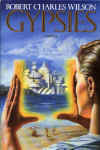
 Alternate worlds, and a family gifted with the ability to travel between
them. Published in a hardcover edition that made it look like a juvenile novel,
which it ainít. The religious dictatorship of the Novus Ordo anticipates the
Valentinian America of Mysterium.
Alternate worlds, and a family gifted with the ability to travel between
them. Published in a hardcover edition that made it look like a juvenile novel,
which it ainít. The religious dictatorship of the Novus Ordo anticipates the
Valentinian America of Mysterium.
From the reviews:
"A blend of science fiction, mystery, and thriller. Spellbinding."
(Publisherís Weekly)
"A distinctive, beautifully turned alternate worlds yarn." (Kirkus)
top
The Divide
(Doubleday, 1990)
-
First edition images - Front Cover -
Full Cover - Front
Flap - Back Flap
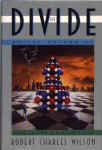 The first of my books to be set in Canada -- Toronto and the West Coast,
specifically. I felt I owed it to the National Gestalt (not that anyone
noticed).
The first of my books to be set in Canada -- Toronto and the West Coast,
specifically. I felt I owed it to the National Gestalt (not that anyone
noticed).
A skinny little book, caught in personnel changes at Bantam/Doubleday and
barely published. It never had a mass-market edition, and only a minuscule
hardcover print run. Admittedly, not a "big idea" novel. Nevertheless:
From the reviews:
"Wilson perceptively imagines a biological monstrosity: John Shaw, an
ordinary human with a souped-up intellect courtesy of hush-hush CIA experiments
with intrauterine hormone injections. As Johnís hypertrophic cortical tissue
succumbs to its faulty genetic structure and begins to die, his personality
yields to an alter ego named Benjamin. His condition touches Susan and Amelie,
two strangers who share Johnís sense of orphaned isolation and profound
betrayal. The women upend their lives to form a fragile family and see John
through to the outcome of his unwilling transformation. Wilsonís skills afford
credibility and even pathos to his fashionings of John and Benjamin, and of the
women who love these sentient, doomed fragments of a being both alien and human.
A taut ending fittingly closes this indelible portrait." (Publishers
Weekly)
"Out of this rich material, Mr. Wilson has shaped a poignant love
triangle (Amelie, Susan and John/Benjamin), a mind-stretching philosophical
conundrum (about the nature of intelligence) and a terrifying confrontation
between John/Benjamin and Roch.... How Mr. Wilson satisfies the demands of
plausibility while contriving a Ďhappy endingí is a secret I wouldnít
dream of giving away." (New York Times)
"Certain comparisons are inevitable. Frankenstein, ĎDr. Jekyll
and Mr. Hyde,í and ĎFlowers for Algernoní all come immediately to mind. In
such illustrious company, Robert Charles Wilson holds his own." (Faren
Miller, Locus)
top
A Bridge of Years
(Doubleday, 1991) -
First edition images - Front Cover -
Full Cover -
Back
Cover
 I began this one on a cross-country train trip from Toronto to Vancouver.
Woke up one night, looked out the sleeping-car window and saw the Northern
Lights reflected in the Alberta snowfields. It seemed like a good omen. In the
morning I showed the prologue to my son Paul, then nine years old.
"Exciting enough?" I asked him. "Maybe too exciting,"
he allowed.
I began this one on a cross-country train trip from Toronto to Vancouver.
Woke up one night, looked out the sleeping-car window and saw the Northern
Lights reflected in the Alberta snowfields. It seemed like a good omen. In the
morning I showed the prologue to my son Paul, then nine years old.
"Exciting enough?" I asked him. "Maybe too exciting,"
he allowed.
Bridge is a time-travel novel, in which Tom Winter discovers that the
rural house to which he attempts to retreat was once owned by a sentinel from
the future. The previous tenant left some of his stuff behind...microbots, a
door to the past, and something disgusting in a shed in the forest....
From the reviews:
"The time traveler of the Prologue and the killer who got past him are
not polar opposites of good and evil, any more than time can be judged on
strictly moral terms. Through the subtle use of a science fictional device, A
Bridge of Years helps us to assess the lengthening strange trips of our own
lives. Subtle yes, but thoroughly engrossing. Recalling the best of Clifford
Simak, this is a book of quiet affirmation, to hold against despair." (Faren
Miller, Locus)
"Wilson transforms a simple time travel novel into a moving reflection
on love, despair and the resilience of the human spirit.... The hunt leads back
to the present and to an exciting, unexpected climax that proves Wilson is a
magician indeed." (Publishers Weekly)
"Logically developed, superbly plotted: altogether a fascinating
adventure." (Kirkus)
"At times it feels like a mainstream character study (but a good one);
at times it feels like a ghost story, which in a sense it is, though the ghost
is quite resurrectable; but what it finally becomes is a love story, not about
romance, but about healing, about coming to terms with solitude, about finding
your own life instead of trying to act out other peopleís scripts for you....
All the sizzle you could ever hope for is here, and all the class. What drives
them both is a storyteller of astonishing compassion and understanding, whose
characters matter to us because they are as complicated and contradictory and
hungry and frightened as the people we know best -- and because they are also as
generous and forgiving and brave as we wish we were, as we try to be, as we hope
that, in our best moments, we already are." (Orson Scott Card, The
Magazine of Fantasy and Science Fiction)
top
The Harvest
(Bantam, 1992)
First edition images - Front Cover -
Full Cover - Front
Flap - Back Flap
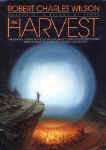 Written in Nanaimo, a small town on Vancouver Island off the coast of British
Columbia, where I briefly owned a house with my first wife Janet. A troubled
time for me, but also a productive one. The room I took as my office looked out
on an uphill slope, and I spent most of a year staring at that scrubby mound and
writing The Harvest. (For relief Iíd go out and drive around in our
beat-up car, sometimes getting lost in the inevitable Pacific fogs.)
Written in Nanaimo, a small town on Vancouver Island off the coast of British
Columbia, where I briefly owned a house with my first wife Janet. A troubled
time for me, but also a productive one. The room I took as my office looked out
on an uphill slope, and I spent most of a year staring at that scrubby mound and
writing The Harvest. (For relief Iíd go out and drive around in our
beat-up car, sometimes getting lost in the inevitable Pacific fogs.)
The Harvest was my biggest book to date in size and in sales. Both the
hardcover and the mass-market edition featured a handsome painting by Pamela
Lee. (The British edition was decorated with a psychedelic butterfly and some
gratuitous crop circles.)
From the reviews:
"Hereís your dilemma: Sometime during the night, a benevolent alien
appears in your dreams and offers you virtual immortality. But thereís a
catch. Although your mind would remain distinct and intact, it would leave your
body permanently and would join with other human minds for an endless tour of
the cosmos. Would you choose centuries of wondrous, cerebral exploration or a
finite existence that celebrates the Earth-bound distinctiveness of humanity?
Thatís the tantalizing question poised by Robert Charles Wilson in The
Harvest, a stunning novel whose seamless blend of mature philosophizng and
crisp storytelling is science fiction at its best." (Toronto Star)
"An intelligently conceived, fully realized novel that might be
considered a gloss on the beautiful line of Yeats that one of the characters
recalls at a key moment: ĎMan is in love and loves what vanishes.í " (New
York Times)
"The Harvest is a satisfyingly complex, emotionally engaging
novel.... It slowly and surely hooks the reader through the power of its
characterizations and the complication of the many encounters among the various
figures who inhabit its landscapes. With each new novel, Robert Charles Wilson
adds to his reputation as one of the best SF writers of his generation." (Books
in Canada)
top
Mysterium
(Bantam, 1994 )
First edition images - Front cover -
Full Cover -
Back Cover
Mysterium was my last novel for Bantam. This one was written in a co-op
apartment complex called China Creek in the city of Vancouver. When I wasnít
working on the book I rode the skytrain down to the grubby part of town where
the second-hand bookshops were, or haunted the beaches around Stanley Park and
wrote longhand, nestled into the dunes among the driftwood and the cigarette
butts.
A small town is transposed into an alternate America ruled by a Valentinian
Gnostic theocracy, which attempts to plunder the townís technological riches
while oppressing its "heretical" inhabitants. This one was optioned
for a TV movie -- never produced, but John Shirley wrote a very nice script for
it.
Mysterium won the Philip K. Dick Award (for best novel originally
published in paperback) for its year.
From the reviews:
"The scariest novels often have less to do with monsters and things that
go bump in the night than with humans who come after you in the bright light of
day. ĎBrave New Worldí and Ď1984,í classics of speculative fiction, are
just such works. Robert Charles Wilsonís new dystopian nightmare, Mysterium,
is almost as engrossing, developing the idea of being plucked out of a safe
everyday existence and being exiled in a world similar to but not quite oneís
own." (Chicago Tribune)
"Wilson blends science, religion, philosophy and alternate history into
an intelligent, compelling work of fiction." (Publishers Weekly)
top
Darwinia
(Tor, 1998)
TOR 1999 paperback edition Images - Full Cover
- Front Cover -
Back
Cover
 Darwinia was written in segments, in Vancouver, Whitehorse (Yukon), and
Toronto. A Hugo finalist and a Locus bestseller.
Darwinia was written in segments, in Vancouver, Whitehorse (Yukon), and
Toronto. A Hugo finalist and a Locus bestseller.
Darwinia was the Aurora Award Winner (Best Long Work, English) for its
year.
From the reviews:
"Donít expect fantasy akin to Tolkeinís wizards and ogres. Wilson
favours a more realistic other-worldliness, reminiscent of the high adventures
of Jules Verne and Arthur Conan Doyle.... As the novel opens in 1912, a
mysterious overnight event, know as the Miracle, has replaced Europe with a
bizarre continent full of strange and deadly creatures. North America is now the
Old World whose scientists are eager to explore the eastern New World theyíve
named Darwinia.... Even savvy readers who suspect Earthís transformation was
caused by extraterrestrials will be rocked by a twist of breathtakingly cosmic
proportions. And as [protagonist Guilford Law] discovers his true role in the
galaxyís destiny, he becomes the focal point for a haunting tale of the
enduring courage of the human spirit." (The Toronto Star)
"Darwinia actually represents a logical next step in the
development of an author whose fascination with alternate timestreams dates back
at least to his 1989 novel Gypsies. But Darwinia is his best, most
complex, and most rewarding exploration of this topic yet, an unlikely
combination of early twentieth-century exploration-adventure, decades-spanning
romantic epic, and cosmic mystery." (Gary K. Wolfe, Locus)
"As the action jumps from the teens and Ď20s to 1945, then 1965, we
see the panoply of history as a struggle between the wildly unfamiliar and the
forces of our own chaotic century, with individuals caught in the middle, their
lives at once bizare and familiar, poignantly vivid, eloquently told. Darwinia
is a remarkable book, worthy of the highest honors in our field. Donít miss
it."
top
Bios
(Tor, 1999)
Tor 2000 Paperback edition images - Full Cover -
Front Cover - Back Cover
 Another skinny little book. There ought to be a separate publishing category
for short books. ("Books That Will Be Ignored on Sight," or something
to that effect.)
Another skinny little book. There ought to be a separate publishing category
for short books. ("Books That Will Be Ignored on Sight," or something
to that effect.)
Itís also a somewhat downbeat book. (When I described it that way to Robert
J. Sawyer, he asked me, "Just how downbeat is it?" I said, "Well,
I donít know -- how do you feel about the last act of Hamlet?")
Not quite so downbeat, however, in its long-term implications.
When I wrote Bios I was going through a difficult divorce and
separation, and maybe it shows. But I dedicated the book to my new wife, Sharry,
who taught me that even the wildest rapids eventually yield to gentle water.
(Thanks, Sharry.)
From the reviews:
Anyone dismayed by the bookís resolution can check out a short sequel
called "The Dryadís Wedding," set 200 years after the events of Bios.
It appeared in Star Colonies (Daw) and in David Hartwellís Yearís
Best SF 6.
"Wilsonís most tightly constructed pure adventure tale to date."
(Locus)
"Another triumph from one of the most amazing authors writing science
fiction today." (Rocky Mountain News)
top
The Perseids and Other Stories
(Tor, 2000)
 My first collection -- Iím not a natural short-story writer. The title
story was an Aurora Award winner and a Nebula finalist; "The Inner Inner
City" was a WFA finalist; "Divided by Infinity" was a Hugo
finalist; and the collection as a whole was a finalist for the 2001 World
Fantasy Award.
My first collection -- Iím not a natural short-story writer. The title
story was an Aurora Award winner and a Nebula finalist; "The Inner Inner
City" was a WFA finalist; "Divided by Infinity" was a Hugo
finalist; and the collection as a whole was a finalist for the 2001 World
Fantasy Award.
Many of the stories appeared originally in Don Hutchisonís Northern
Frights series of anthologies.
Iím fairly proud of this little book. My favorite piece is "Ulysses
Sees the Moon in the Bedroom Window," which I think says much in a small
space -- and isnít that the whole idea of short stories?
From the reviews:
"Wilsonís slow-building, many-layered yarns shape characters out of
the raw materials of loneliness and intellectual isolation. Readers in search of
thoughtful, resonant writing will enjoy this collection of urban
fantasies." (Publishers Weekly)
"Magisterial tales, all.... In a year abounding in good story
collection, The Perseids is yet another strong vindication of the short
form. With nine devastating epiphanies in 224 pages, it outscores countless books
far longer....
"Besides its sensitive and moving depiction of a diverse array of
characters, one of this bookís most appealing qualities is its loving
evocation of Toronto. In Wilsonís hands the city acquires a mysterious aura
that invites exploration. In stark contrast to the car-heavy environment of the
concrete-and-asphalt Toronto, the Toronto of The Perseids and Other Stories
becomes a tactile ecology. (Claude Lalumiere, January Magazine)
The Perseids and Other Stories was a New York Times Notable Book.
top
The Chronoliths
(Tor, 2001) - Sample
Chapter
First edition images - Front Cover -
Full Cover -
Front
Flap - Back Flap -
Back
Cover
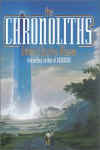 A personal favorite of mine, and it seems to be selling briskly. My first
first-person novel. Time travel as a feedback loop. A New York Time Notable
Book, a Hugo finalist, and winner of the John W. Campbell Memorial Award.
A personal favorite of mine, and it seems to be selling briskly. My first
first-person novel. Time travel as a feedback loop. A New York Time Notable
Book, a Hugo finalist, and winner of the John W. Campbell Memorial Award.
There's something intoxicating about writing in the first person. Confessing
to other people's sins. Like walking down the street naked, but in someone
else's body. I was also pleased with the revisionist take on time travel and
temporal paradox.
From the reviews:
"Wilson's tenth and best.... It is a major novel." (Jonathan
Strahan, Locus)
"Wilson deftly interweaves a plausible time-travel thriller with the
tender tale of a likable but immature loser who responds to adversity by growing
up.... Stands with his best." (Gerald Jonas, New York Times)
"The resolution is exciting, thought-provoking, and ingenious. Wilson is
unquestionably one of the most interesting and entertaining SF writers working
today." (Don D'Ammassa, SF Chronicle)
"Wilson creates an appealing cast of slackers, drug dealers, addicts,
absent-minded geniuses, and cult followers, all endowed with real human
consciences, making their predicament all the more shocking when evil shows up
in their midst.... At its heart, The Chronoliths is a compelling
exploration of imperfect people trying to do the right thing." (Nalo
Hopkinson, Quill & Quire)
top
Blind Lake
(Tor, 2003)
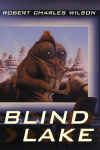 Blind
Lake reached bookstore shelves in August 2003. Looks good, too,
with a cover by Jim Burns featuring "the Subject" Ė the
extraterrestrial individual under study at the Blind Lake National Laboratory.
Alas, no Jim Burns depiction of the Blind Lake site itself or of the main
characters Ė I canít help wondering how he would have imagined Tessa Ė but
the Art Department ainít my department, and Iím not complaining. Blind
Lake was a 2004 Hugo Award finalist and won the 2004 Prix Aurora award for
Best Long-Form Work in English. It also was a New York Times Notable Book of the
Year for 2003.
Blind
Lake reached bookstore shelves in August 2003. Looks good, too,
with a cover by Jim Burns featuring "the Subject" Ė the
extraterrestrial individual under study at the Blind Lake National Laboratory.
Alas, no Jim Burns depiction of the Blind Lake site itself or of the main
characters Ė I canít help wondering how he would have imagined Tessa Ė but
the Art Department ainít my department, and Iím not complaining. Blind
Lake was a 2004 Hugo Award finalist and won the 2004 Prix Aurora award for
Best Long-Form Work in English. It also was a New York Times Notable Book of the
Year for 2003.
Reviews so far have been overwhelmingly positive. Starred reviews in Kirkus
and Publishers Weekly; Kirkus called it "fizzing with ideas while
tightly focused on the characters: intense, absorbing, memorable work."
Gary K. Wolfe at Locus described the book as "a fine novel embedded
in a Big Question" but felt some of the characters were "subsumed in
the ontological discourse." (Hey, I like my ontological discourse --
itís brightly colored and has lots of moving parts!) The Rocky Mountain
News said, "Amid romance, murder, and insanity, the author brings
everything together in a surprising conclusion. Blind Lake is a
fascinating tale, masterfully told."
Plot summaries available at Amazon.com and elsewhere Ė but how much do you
really ever learn about a book from a plot summary? I think of it as a book
about storytelling and mirrors.
top
Spin (Tor, March 2005)
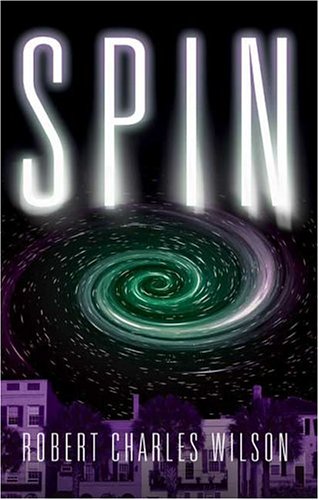 SPIN has been wonderfully well-received. It was one of those "out
on a limb" books during the writing -- the kind where you ask yourself,
"Can I get away with this?" But they don't pay you for timidity,
I guess. Every time I've stuck my neck out, in the literary sense, I've
been rewarded for it.
SPIN has been wonderfully well-received. It was one of those "out
on a limb" books during the writing -- the kind where you ask yourself,
"Can I get away with this?" But they don't pay you for timidity,
I guess. Every time I've stuck my neck out, in the literary sense, I've
been rewarded for it.
top
Julian: A Christmas Story (PS
Publishing, Dec 2006)
 Link to Rob's
comments on his website
Link to Rob's
comments on his website
top
Axis (Tor, Sept
2007)
 Link
to Rob's comments on his website
Link
to Rob's comments on his website
top
What comes next?
Rob is currently working on the novel Julian Comstock: A Story of
the 22nd Century which is a continuation of his Hugo Award-Winning
novella Julian: A Christmas Story
He will then be writing Vortex, which is the
third and final volume of the Spin trilogy.
top
Click here for Robert's
Home page.
Contact Robert at mcwilson@interlog.com



 My first novel.
Well-received when it was first published (it was a Philip K. Dick Award
finalist) and soon to be reprinted by Tor. I havenít re-read this for some
years, but I remember writing it under the influence of Carson McCullers and
Jungian psychology. I had published only a couple of stories when Shawna
McCarthy, then editor at Bantam Books, asked me whether I had a novel she could
look at. A Hidden Place was it, and I approached it with the young writerís
predictable excess of ambition and dearth of experience. Nevertheless, I think
itís a likeable book, and it probably set the tone for much of my later work
with its underlying melancholy and moodiness.
My first novel.
Well-received when it was first published (it was a Philip K. Dick Award
finalist) and soon to be reprinted by Tor. I havenít re-read this for some
years, but I remember writing it under the influence of Carson McCullers and
Jungian psychology. I had published only a couple of stories when Shawna
McCarthy, then editor at Bantam Books, asked me whether I had a novel she could
look at. A Hidden Place was it, and I approached it with the young writerís
predictable excess of ambition and dearth of experience. Nevertheless, I think
itís a likeable book, and it probably set the tone for much of my later work
with its underlying melancholy and moodiness.









 Darwinia was written in segments, in Vancouver, Whitehorse (Yukon), and
Toronto. A Hugo finalist and a Locus bestseller.
Darwinia was written in segments, in Vancouver, Whitehorse (Yukon), and
Toronto. A Hugo finalist and a Locus bestseller. Another skinny little book. There ought to be a separate publishing category
for short books. ("Books That Will Be Ignored on Sight," or something
to that effect.)
Another skinny little book. There ought to be a separate publishing category
for short books. ("Books That Will Be Ignored on Sight," or something
to that effect.) My first collection -- Iím not a natural short-story writer. The title
story was an Aurora Award winner and a Nebula finalist; "The Inner Inner
City" was a WFA finalist; "Divided by Infinity" was a Hugo
finalist; and the collection as a whole was a finalist for the 2001 World
Fantasy Award.
My first collection -- Iím not a natural short-story writer. The title
story was an Aurora Award winner and a Nebula finalist; "The Inner Inner
City" was a WFA finalist; "Divided by Infinity" was a Hugo
finalist; and the collection as a whole was a finalist for the 2001 World
Fantasy Award.
 Blind
Lake reached bookstore shelves in August 2003. Looks good, too,
with a cover by Jim Burns featuring "the Subject" Ė the
extraterrestrial individual under study at the Blind Lake National Laboratory.
Alas, no Jim Burns depiction of the Blind Lake site itself or of the main
characters Ė I canít help wondering how he would have imagined Tessa Ė but
the Art Department ainít my department, and Iím not complaining. Blind
Lake was a 2004 Hugo Award finalist and won the 2004 Prix Aurora award for
Best Long-Form Work in English. It also was a New York Times Notable Book of the
Year for 2003.
Blind
Lake reached bookstore shelves in August 2003. Looks good, too,
with a cover by Jim Burns featuring "the Subject" Ė the
extraterrestrial individual under study at the Blind Lake National Laboratory.
Alas, no Jim Burns depiction of the Blind Lake site itself or of the main
characters Ė I canít help wondering how he would have imagined Tessa Ė but
the Art Department ainít my department, and Iím not complaining. Blind
Lake was a 2004 Hugo Award finalist and won the 2004 Prix Aurora award for
Best Long-Form Work in English. It also was a New York Times Notable Book of the
Year for 2003.


